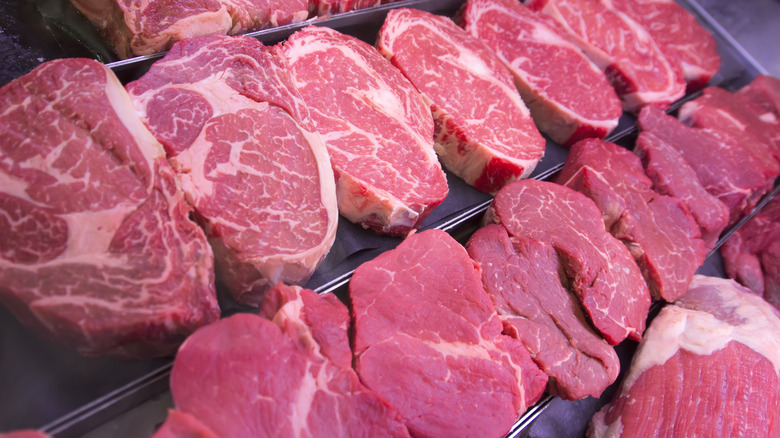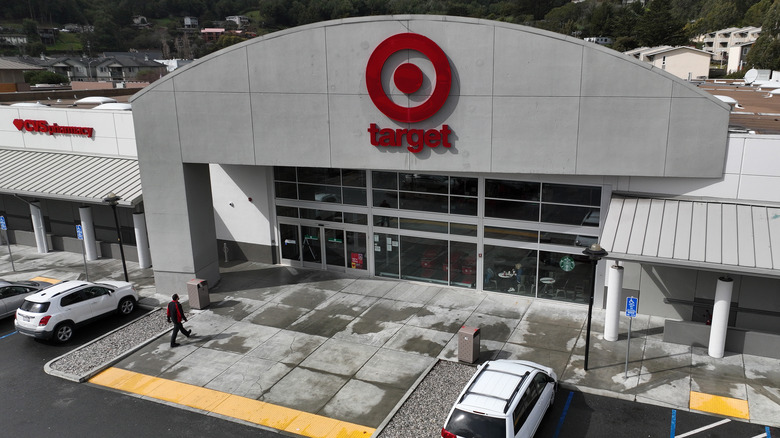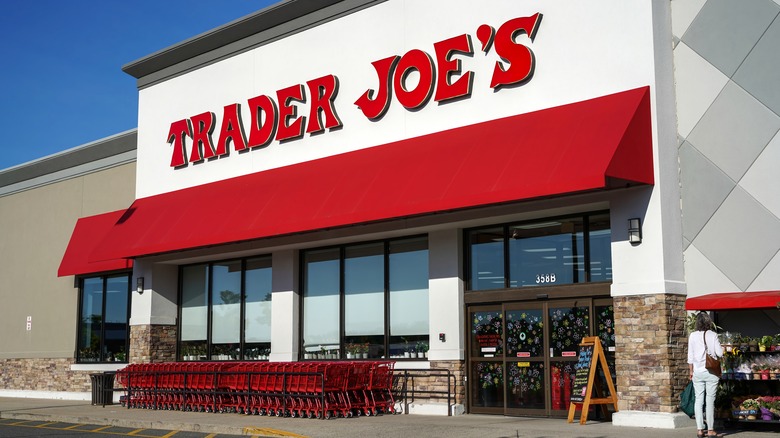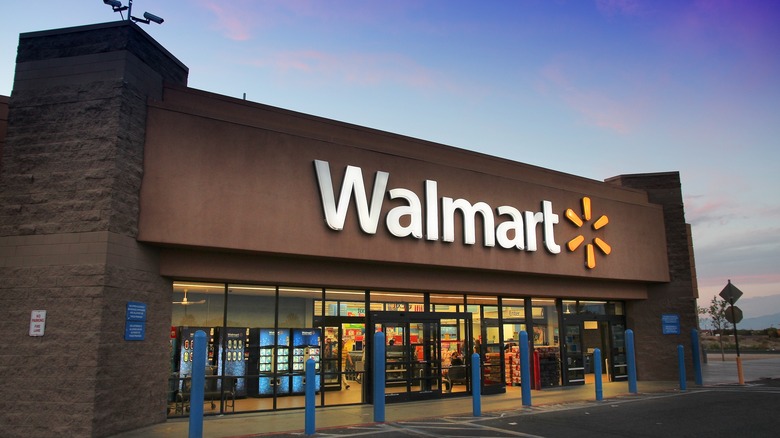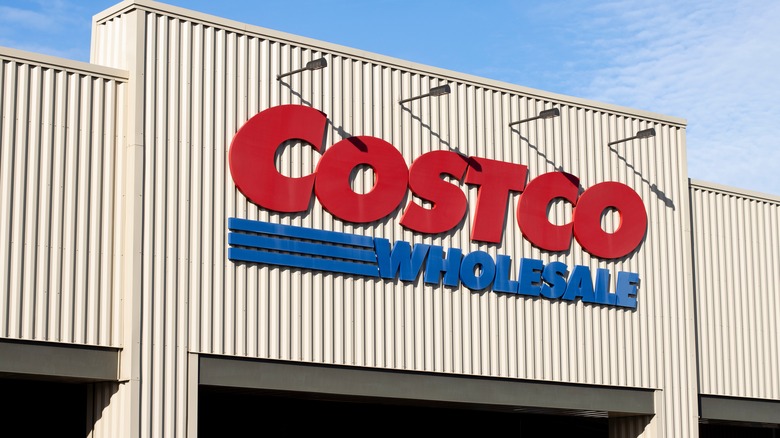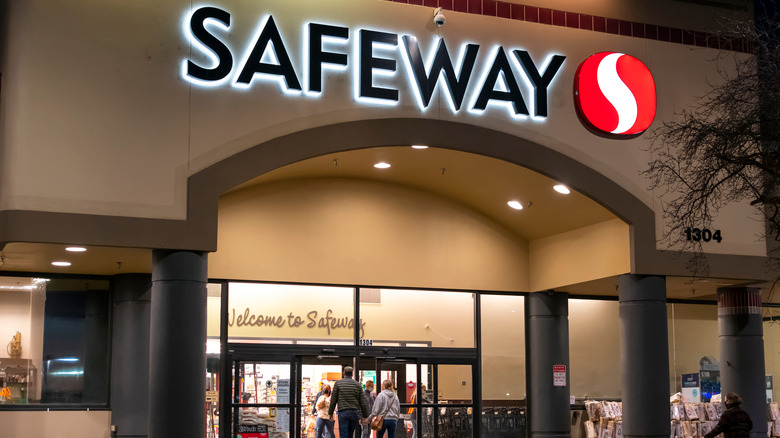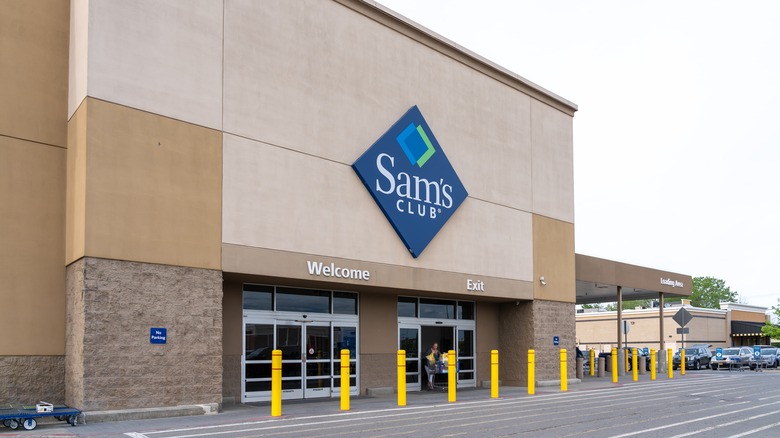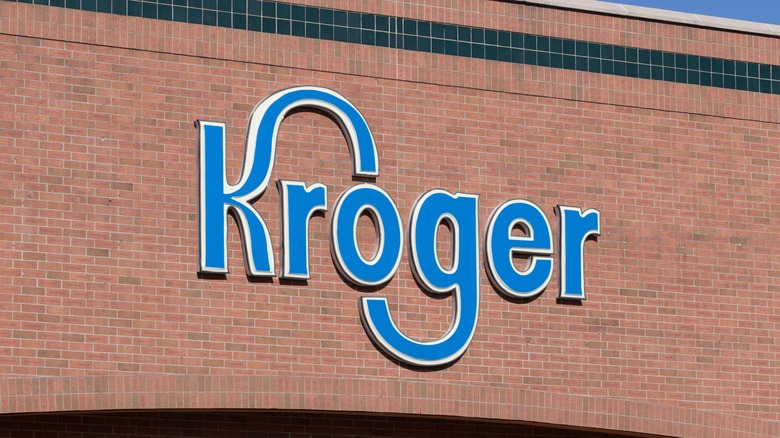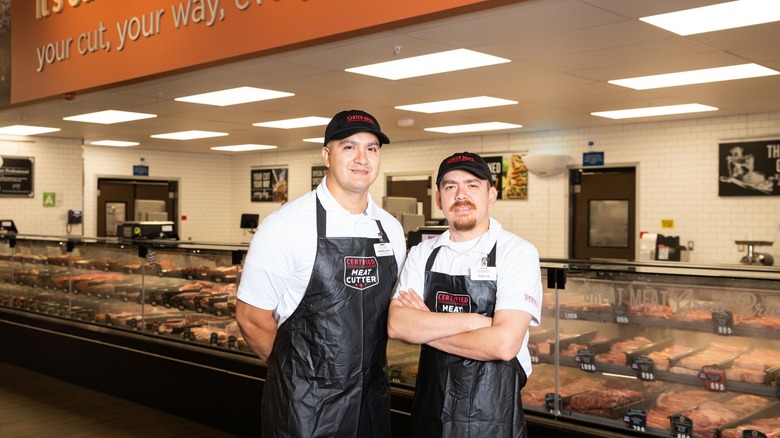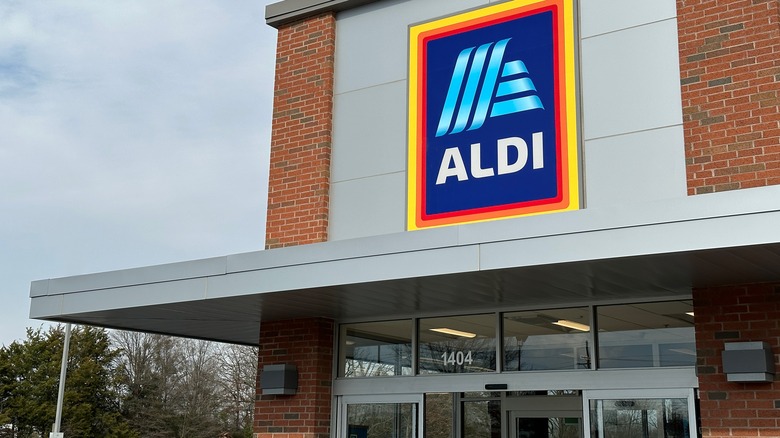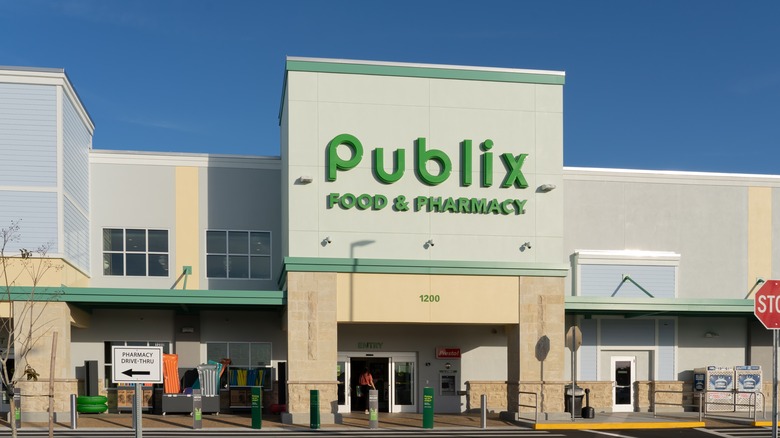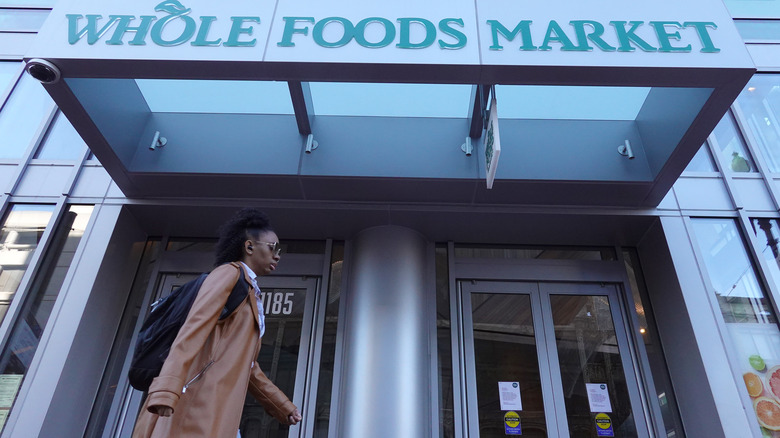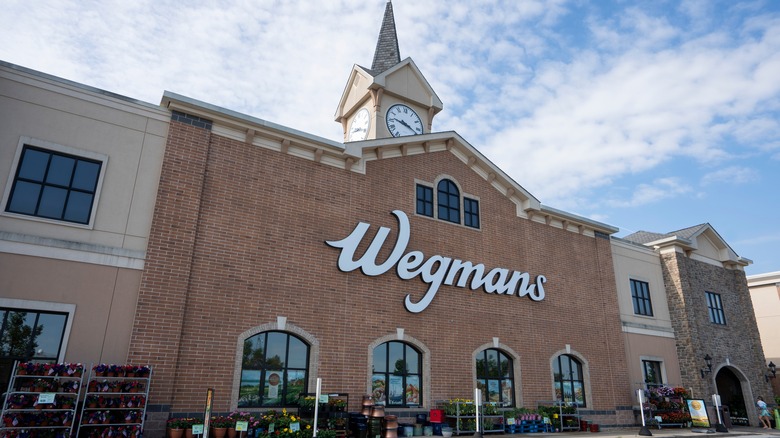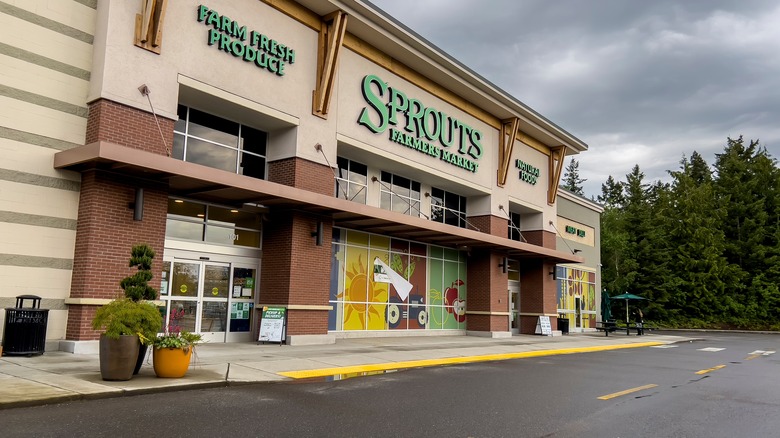14 Popular Chain Grocery Stores For Meat, Ranked Worst To Best
Correction 5/15: A previous version of this article indicated that Stater Bros. exclusively sources its meat from Harris Ranch. Meat from multiple brands is sold at the chain.
There's so much more to finding the right cut of beef or the highest quality of pork than just sifting through the pre-packaged selection at the local grocery store and checking for the sell-by date. You also want to look for other information, such as if the meat came from a local farmer, whether the animals were grass-fed, or if the meat received any kind of additional treatment, such as dry-aging or grain-finishing.
Typically, the best location for meat shopping is from a local butcher who specializes in all things meat. However, independent butchers aren't common any longer. Especially if you live in a smaller community where the only meat options you have available are found at the local big-box grocery store. While you can still find quality meat in these large chains, some are absolutely better than others. To help you determine which grocery store carries the highest quality and largest meat selections, here is a rundown of the best and the worst chain grocery stores for buying your meat.
14. Target
Even if you go to a Super Target, the meat selection is subpar. And if it is a regular Target, there are only a few pre-packaged cuts of meat. Target also doesn't have an on-site butcher, so everything is pre-packaged. In general, we would avoid heading to Target to shop for meat.
The general quality of Target meat, whether it is the small display at a traditional Target or the enhanced offering found at a Super Target, is on par with most other grocery stores. While Target does have its own "Food Animal Welfare Commitments," the meat it sells comes from Thomas Foods, the same meat provider as Walmart and Safeway. A small percentage of meat from Thomas Foods comes from Nicaragua. If you're curious as to where the meat does come from, make sure to read the labeling closely on the package before purchasing. The only real reason why we have Target listed below the other two locations is because of the volume of meat available.
13. Trader Joe's
You might be surprised to find Trader Joe's so far down on this list. Now, the meat the grocery store does sell is fantastic. The problem is the selection. There's very little of it. You can stand in front of the small display of meat without turning your head. So grab meat from Trader Joe's if you're already there, but don't go out of your way to shop for meat from Trader Joe's.
One of the issues with Trader Joe's, however, is it can be difficult to backtrack the company's food sources. Just about everything sold at Trader Joe's is a third-party manufacturer, such as Teva, Kayem Foods, and Empire, and the company simply slaps its own label on top and sells it as its own. The exact company it buys from will likely vary depending on where you live. A Trader Joe's in Arizona will likely obtain its meat from a different location than Trader Joe's in Michigan.
The main reason why we have Trader Joe's this far down on our list is that it is difficult to identify exactly where the meat comes from. That might not be a big deal if you're buying boxed cookies. But when it comes to meat, that would be something nice to know.
12. Walmart
While the Walmart Supercenter might have a large meat selection, it isn't always possible to track down where the meat came from, and you're not going to find many specialty cuts. You will find some organic options, but there won't be many options when it comes to dry-aged and grain finished.
As we covered in the Target section, much of the meat Walmart offers comes from Tyson and Cargill. The main difference between Walmart and Target is you will find a larger selection of meat in Walmart. Most Walmart grocery stores are now Supercenters, and the Neighborhood Markets provide a large selection of meats as well. Even the smaller Walmart grocery stores still have an adequate meat selection.
However, in addition to Thomas Foods, the grass-fed meat, which includes grass-fed beef, comes from within the United States (typically Wyoming and Utah). Walmart also recently purchased a stake in Sustainable Beef LLC, which is a rancher-owned meat company based in Nebraska.
11. Meijer
This Midwest grocery staple does have a wide display of meat. While you're not going to find the unique animal offerings found at, say, a Kroger, if you need basic cuts of meat or hefty amounts, Meijer is a solid option to consider.
Meijer, like other grocery stores, has a very specific "Animal Welfare" pledge to its customers. Part of the pledge is any animal product sold within a Meijer is cared for and processed within 250 miles of the store location. This helps ensure a higher quality of freshness. So while a Target or Walmart might send beef from Utah out to New York state, a Meijer in northern Michigan will likely sell meat that is only from within Michigan or Wisconsin.
Another major benefit of buying meat from Meijer is all meat is freshly cut and put on display daily, so you're not going to sift through meat that has been sitting on shelves for long periods of time.
10. Costco
You're probably not going to find a better-priced cut of steak at Costco. Because the company buys so much at once, the price savings are passed down to you. Specialty cuts are difficult to come by, although there is usually a butcher on hand to assist with your meat needs.
Costco receives its meat from all around the world. While the chicken, veal, and pork are all sourced from various locations around the United States, the beef comes from not only the U.S. but Canada, Australia, and even Southeast Asia. Eggs come from just about every corner of the globe, with some eggs coming from Latin America and Southeast Asia, although the majority of egg products do originate within the United States.
Costco does sell more than just beef and chicken, though. You can find lamb, the majority of which comes from Australia. Veal, on the other hand, is typically sourced from farms in New York state and Ohio.
9. Safeway
Safeway has fewer meat options than those coming up on the list. Sure, you'll find beef, chicken, and pork, but not much else. The meat offered at Safeway comes from some of the country's largest meat producers, which means you'll find much of what you find at Safeway at other big-box grocery stores. Most of the U.S. beef comes from Thomas Food, a provider of beef to Target and Walmart, as well as Rancher's Reserve, which is a beef brand owned by Safeway.
Safeway retails meat that not only originates in the United States but Canada as well. So, depending on your Safeway location, the meat might be from either a domestic location or a Canadian ranch. However, Safeway does have its own agreement with the Aspen Ridge Canadian beef manufacturers. All of these cows are humanely raised, are never fed antibiotics, nor are they given hormones. You can identify meat that comes from these Canadian ranchers as there will be a "Certified Humane: Raised & Handled" sticker on the package.
8. Sam's Club
Sam's Club and Costco have a lot of similarities. Both big-box grocery stores have similar selections, although Sam's Club tends to have higher quality cuts of meat available for consumers. One of Sam's Club's biggest advantages over Costco is that it does not purchase any of its meat from China. As is the case with Walmart, Sam's Club receives all of its meat from within the United States. Some of the beef providers of Sam's Club include National Beef, Swift, Farmland, and Nebraska Beef, just to name a few.
Sam's Club has several animal welfare acts set up, both for grazing animals as well as chickens. By 2025, 100% of chickens will be cage-free, and no poultry antibiotics will be used within the chickens. This is much easier to monitor and ensure as all of the producers are within the United States. That cannot be said of Costco, especially in locations such as China. Due to this, we list Sam's Club ahead of its bulk competitor.
7. Kroger
The meat selection at your neighborhood Kroger is, in general, pretty decent. Many locations also tend to have a surprisingly good selection of fish. So whether you're making steak or pork chops for dinner, chances are you'll find what you need at Kroger.
Kroger beef is of a high standard. The majority of its meats, whether it be pork, beef, or chicken, come from JBS and Tyson Foods subsidiaries. The organic beer Kroger offers in its stores comes from Simple Truth, which is an organic beef ranch in Uruguay. None of the cattle in Uruguay receive any hormones or antibiotics. The beef then receives a USDA grade, so it is all up to U.S. beef standards.
Beef from Uruguay meets and often exceeds the quality standards found within the United States. According to American University, in 2015, Uruguay became the first country outside of the United States to receive the USDA's "Never Ever 3" certification. Known as the NE3 certification, it means cattle were "never ever" given antibiotics, growth hormones, or fed animal byproducts of any kind.
6. Stater Bros.
This California-based grocery store has not only an excellent selection but one of the most comprehensive butcher sections of any chain grocery store. In fact, for someone to work in the butcher department, they need to pass a two-year training program in the state.
The only reason Stater Bros. isn't higher on this list is because it has a limited selection of meats. However, in terms of beef, you'll be hard-pressed to find many other grocery stores that can compete with the quality of Stater Bros. beef (as well as the information available on it).
Stater Bros. receives its meat from multiple sources including National Beef, Excel, and IBP. It also offers a wide selection of options from Harris Ranch, a ranch that has been family owned since 1937. Being able to trace beef back to its source directly is very beneficial. With that said, Harris Ranch moves cattle off grass feed and switches them to corn feed about four months before slaughter. The ranch also uses some antibiotics, although testing on all beef is performed prior to shipment to ensure there is no antibiotic residue. Ideally, we would like to see more exclusive grass-fed options, but we do appreciate the ability to know exactly where our beef is coming from and what happens to it while on the ranch.
5. Aldi
The history of Trader Joe's is closely intertwined with that of Aldi, so it's not surprising that the two stores often have a great deal in common. While Trader Joe's has so much going for it, Aldi beats it out in terms of both meat selection and price. Aldi also does what it can to purchase from local companies. So while there's no guarantee when searching the label on your meat, there's a better chance you'll find locally-processed meat in your Aldi grocery store than in most other grocery chains.
Aldi offers some of the most affordable meat options for any company on this list. The company does use similar sourcing practices as its counterpart, Trader Joe's; the big difference here is Aldi sources its meats from regional farms. This helps keep the cost of its meat lower than the competition. The downside with shopping at Aldi's though is Aldi, much like Trader Joe's, does not specifically list the farm its beef comes from. The company's chicken, however, comes from Tyson Foods. Some of the meat is imported at Aldi from Canada, New Zealand, Mexico, and Australia, but none is brought in from China.
4. Publix
Whether you live in the Southeastern United States or you've visited, residents will swear by Publix. Whether it's the freshly made deli sandwiches or the wide assortment of basically everything, Publix has you covered. You're going to find most of your meat requirements here, and, more often than not, Publix will have better prices than three of the next four options.
Publix prides itself on having some of the highest quality food on the market. This holds true with its meat selection as well. All of the meat sold within Publix are hormone free as well as free of antibiotics. The animals are also vegetarian, so you never have to wonder if the meat you're consuming was ever, at any point in time, fed animal byproducts. Publix states its meat is "farm to table." Now, that term itself doesn't mean all that much because, after all, there are a million farms scattered around the globe, so saying "farm to table" could mean a farm located in the center of the Ganges River to your table. However, for Publix, all of the meat is locally sourced from farms within the United States, so you don't have to worry about meats coming from overseas.
All cattle are grass-fed, while all chicken is cage-free, with access to both sunlight and fresh air. Additionally, all pigs are raised on family farms. Publix also offers a guaranteed return policy on all unopened meats (except for fish).
3. Whole Foods
In terms of both quality and selection, few grocery stores are able to match that of Whole Foods. Now, you will likely pay a premium price for the meat sold at the upscale grocer, but if you're looking for a unique cut, beef that is dry-aged, or you just want to surround yourself with excellent quality and selection, you can't go wrong with Whole Foods.
The chain offers a lengthy list of standards for its meat department on the company website. That checklist includes no antibiotics or added growth hormones for any Whole Foods meats. Stores also offer meats that are sourced from local farms. However, keep in mind that if a selection doesn't carry the "local" label, it may be sourced from a brand that is under the banners of Tyson and Perdue, two massive meat producers in the U.S. that companies like Walmart use.
2. Wegmans
This location only does you any good if you live in the Northeastern United States (more specifically around New York state, although you can find them elsewhere. Since 2011, Wegmans has had an exclusive contract with Senterfitt Farms. Senterfitt Farms is based out of Vermont, and all of the beef is grass-fed and grazed naturally on the property. The farm also does not use hormones or antibiotics in its animals. While the majority of beef does come from Senterfitt Farms, Wegmans also works with 80 regional farmers spread throughout the Northeast, all of which provide the regional grocery chain with 100% grass-fed beef.
Wegmans is one of the few grocery stores that have a specific connection with its farms and ranch. So, when you purchase beef from Wegmans, you know exactly where it is from. All of the other meats, whether it be chicken, pork, or lamb, come from regional farms located in Pennsylvania, Virginia, Massachusetts, and New York. Thanks to its regional meat producers as well as the ability to directly track what farms and ranches the meat comes from, Wegmans is one of the best places to buy your meat.
1. Sprouts
If you haven't been in Sprouts before, just think of it like a Whole Foods, only larger. Sprouts have on hand an excellent fresh produce selection, as well as possibly the best displays of meat. Whether you need lamb, beef, pork, turkey, heck, even duck, or other meat options, you're going to find it at Sprouts. Sprouts might not be as readily available as Whole Foods, but if there's one in the area, take advantage of its meat offering.
Sprouts not only has an exceptional selection of meat, but it is also some of, if not the highest quality meat you're going to find. The 100% grass-fed beef all comes from Grass Run Farms, where the cattle are not given antibiotics or hormones. The cattle also live on open pastures and not enclosed pens. So, while other grocery stores do offer organic beef, all of the beef sold in Sprouts is grass-fed and skips out on hormones and antibiotics. The ranches are located in the Midwest, and the animals are fed grasses and forage the entirety of the year.
In addition to beef, all pork sold at Sprouts is raised without beta-agonists or antibiotics. While pigs that become sick are treated by a veterinarian and given necessary medicine, these pigs are removed from the supply chain. As for chickens, laying hens are cage-free, and by 2025, all farms Sprouts sources from will have a maximum of 6 pounds of chicken per square foot.
